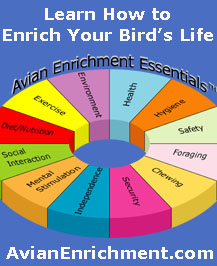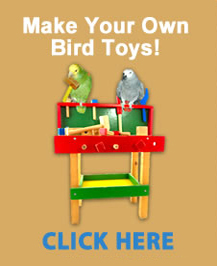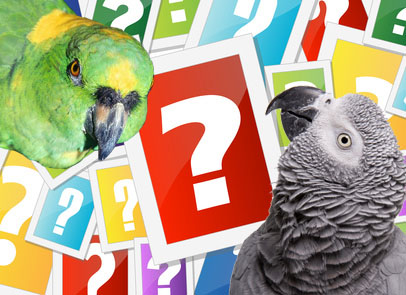
As discussed in our article "Is a Bird The Right Pet for Me?" there are many aspects of bird ownership to ponder before deciding to bring a parrot into your home. If you have positively answered those questions and are willing to make the commitment to ensuring a fully enriched life for your feathered companion then it is time to consider that species would make the best fit for your family.
The choice of a suitable species may hinge on several factors including:
- your ability to tolerate noise
- your desire to have a talking pet
- your fear of "BIG" bites
- space considerations
- the presence of very young children in your household
- your financial ability to provide care and enrichment
- your age and health relative to a bird's lifespan
Additionally, everyone should give serious consideration towards adopting a parrot from a rescue rather than purchasing one.
All of these issues are presented in more detail below:
Adoption vs. Purchase
There are many great reasons to adopt rather than buy a bird:
- There is an overabundance of birds in captivity that deserve a forever home and by adopting you would be doing a great thing!
- A store purchased pet is an “unknown”. An adoptive bird is already an adult with a known history and temperament. The rescue is also invested in ensuring that they find the right fit and a forever home for any adoption placement so the bird can find its forever home.
- You know the bird you are bringing into your home has seen a qualified veterinarian and is healthy.
- An adopted pet can be just as loving, intelligent and entertaining as a purchased bird. It is mistake to think that you need to purchase a baby bird in order to bond with it.
- The cost to adopt is less than the cost to purchase.
The Noise Factor
If noise is a big concern for you or, if it is not an option where you live due to the close proximity of neighbors, then you are still in luck as there are several parrot species that are known to be quieter in their demeanor. Recommended species you may want to consider are:
- African Grey Parrot
- Budgies
- Cockatiels
- Lovebirds
- Parrotlets
- Pionus
- Senegal parrot
Talking Ability
One of the most fascinating characteristics of many pet birds is their ability to talk and often use our language in context. There are never guarantees that an individual bird will talk but some species are known to have a larger probability of talking. The parrot species most recognized for their talking abilities are:
- African Grey Parrots
- Amazons
- Budgies
- Indian Ringnecks
- Quaker Parrots
Fear of the All-mighty Beak
OK, the truth is if it has a beak it will likely bite at some point. Biting is largely a learned behavior in parrots and it more often arises out of frustration on our bird's part when we ignore their means of comminicating. Please refer to our article "Why Does My Bird Bite?" for more insight into this behavior.
Large birds have the physical ability to exert a lot of pressure with their beaks and cause significant damage and therefore they are not recommended for inexperienced bird owners or those who are unwillling to participate in training exercises with their parrot. If the potential for serious bites is a concern in your household then small to medium sized species should be considered.
Available Space
The amount of space a bird needs grows exponentially with the size of the bird. Birds need as large a cage as possible, outside of the cage play areas and perching stations and room to fly if unclipped. If you live in a small apartment with restricted or small compartmentalized spaces then only small to medium birds should be considered.
Kids and Chaos
If you have young children in the house or very rambuctious older children then you must assess the suitability of a particular species for your household. The top choices of pet birds for young children are Budgies, Cockatiels and Small Conures.
Financial Considerations
The initial cost of purchasing a bird is just the start! The next biggest expense is purchasing a quality cage and accesirories. Over a bird's lifetime they will also require veterinary care, lots of toys and a high quality diet. If finances are a concern then consider staying with a smaller parrot like a budgie, cockatiel, lovebird or parrotlet as they will be much gentler on your pocketbook over the long run.
Longevity Concerns
By the time we can afford one, larger parrots have the potential to outlive us. Macaws and cockatoos have been known to live in excess of 60 years and even to over 100 years. Typically , the smaller the bird the shorter their lifespan. When considering a bird it is necessary to research what a particular species lifespan may be relative to your own. If you are older and desire to have a larger parrot species in your life then perhaps adopting an older bird from a rescue would be the best alternative for you as well as the bird! There are many excellent pet birds available in rescues who have lost their owners who would love to be part of a new home. One key advantage to this scenario is that the rescue staff should be knowledgable of a particular bird's history, personality and behavioral traits and therefore be able to help match you with the right bird.
To learn more about individual bird species please explore our website further.







































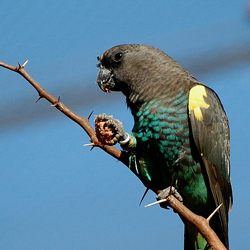


























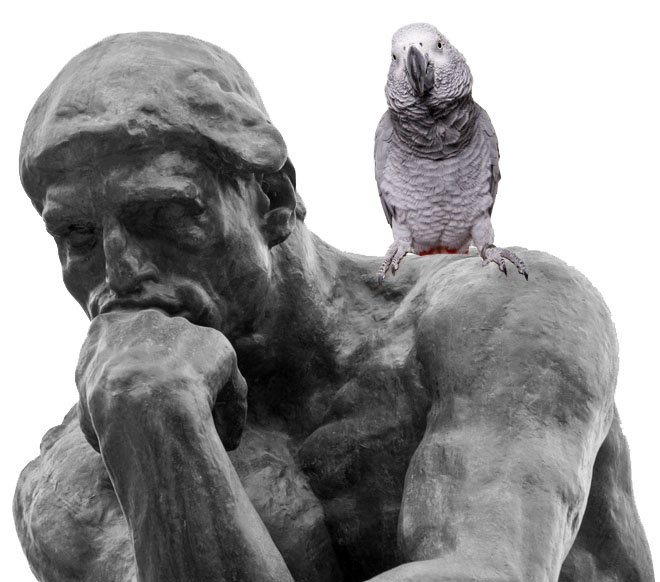 Having a pet is really great but, it also is a huge responsibility! Birds can make absolutely wonderful pets and companions given proper care and training, few pets are as engaging as parrots!
Having a pet is really great but, it also is a huge responsibility! Birds can make absolutely wonderful pets and companions given proper care and training, few pets are as engaging as parrots!


